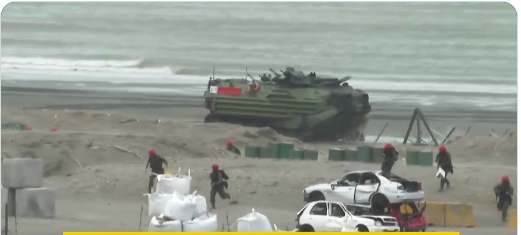China knows that to stick to Xi’s timeline, they need to move on Taiwan before the election in November, as President Trump will make their invasion a nightmare for them. This compared to doing their worst while their bribed Presdient is still installed in the White House. It is just logical that they move sooner rather than later.
On Monday, during a diplomatic visit to Taiwan, House Foreign Affairs Chairman Michael McCaul, a Republican from Texas, compared China’s hostility toward Taiwan to the global tensions of World War II. McCaul emphasized the importance of democratic nations uniting against global threats such as Russia, Iran, and China. He highlighted the current international climate as one marked by aggression and tyranny not seen since the era of World War II.
Republican Congressman Michael McCaul met Taiwan's new president, Lai Ching-te, to affirm US support for the self-ruled island, in a meeting strongly condemned by China.
The visit came just days after Beijing ended military drills that simulated an attack on Taipei. pic.twitter.com/oc2O71THc5
— Al Jazeera English (@AJEnglish) May 27, 2024
McCaul led a bipartisan group of U.S. House lawmakers on a multi-day visit to Taipei, which included meetings with Taiwan’s President Lai Ching-tse and Foreign Minister Jaushieh Joseph Wu. This visit was notable as the first interaction between U.S. officials and Taiwan’s new leadership, who had been in office for just over a week. In these meetings, the topic of China’s increasing threats was a significant discussion point, with McCaul mentioning updates on military support to Taiwan.
Representative Young Kim of California, who chairs the Indo-Pacific subcommittee, described the meetings as productive, with a clear consensus that conflict in the Taiwan Strait is undesirable. The delegation’s goal, Kim stated, was to provide Taiwan with the necessary support to deter potential conflicts and defend itself.
The delegation also included representatives such as Andy Barr of Kentucky, Joe Wilson of South Carolina, Jimmy Panetta of California, and Chrissy Houlahan of Pennsylvania. The urgency of addressing China’s aggressive posture in the Indo-Pacific was a common theme throughout the discussions.
China is preparing a fleet of ferries and civilian ships to invade Taiwan as it increases its pressure on the island nation.
It is not a question of if, but when. pic.twitter.com/VgiJwTlDoE
— Shadow of Ezra (@ShadowofEzra) May 26, 2024
The context of their visit was underscored by recent aggressive actions by China, including surrounding Taiwan with warships and military planes. This military display was interpreted by Beijing as a response to Taiwanese leadership advocating for independence. Foreign Minister Wu described this as a form of unwelcome greeting to the U.S. delegation, signaling China’s broader displeasure with Taiwan’s democratic governance.
McCaul criticized these intimidation tactics during a press conference, highlighting the ideological battle between democratic values and authoritarian governance as represented by China. He recalled statements from Chinese leadership disparaging democracy and emphasized the lack of freedom and power for the people under such regimes.
🇺🇸US LAWMAKERS AFFIRM SUPPORT FOR TAIWAN!
A senior US lawmaker affirmed on Monday Washington's support for Taiwan against Chinese "aggression", on the first congressional visit to the self-ruled island since it swore in a new president. -Rfi
Representative Michael McCaul:🇺🇸… pic.twitter.com/RfByJcDa6p
— WORLD AT WAR (@World_At_War_6) May 27, 2024
The visit coincided with military drills by China, similar to previous patterns observed during McCaul’s visits, prompting him to comment on the personal nature of these intimidations. Wu characterized the visit as a strong signal of bipartisan U.S. support for Taiwan during these challenging times.
In his interactions with U.S. officials, President Lai referenced Ronald Reagan’s policy of “peace through strength,” committing to enhance reforms and bolster Taiwan’s national defense to demonstrate the determination of the Taiwanese people to defend their homeland. The meetings not only focused on strategic and military discussions but also included personal exchanges, such as McCaul presenting a Stetson hat to President Lai, symbolizing the warmth and camaraderie between the two sides.
Major Points
- House Foreign Affairs Chairman Michael McCaul, R-Texas, compared China’s hostility towards Taiwan to World War II-era global tensions during a visit to Taipei.
- McCaul led a bipartisan U.S. delegation in meetings with Taiwan’s new President Lai Ching-tse and Foreign Minister Jaushieh Joseph Wu, discussing military support and regional threats.
- Representative Young Kim emphasized the delegation’s focus on deterring conflict and supporting Taiwan’s self-defense capabilities.
- Recent aggressive maneuvers by China, including surrounding Taiwan with military forces, were highlighted as intimidation tactics against Taiwanese democracy.
- The visit showcased strong bipartisan U.S. support for Taiwan, with both sides emphasizing their commitment to peace and defense enhancements.
Susan Guglielmo – Reprinted with permission of Whatfinger News



